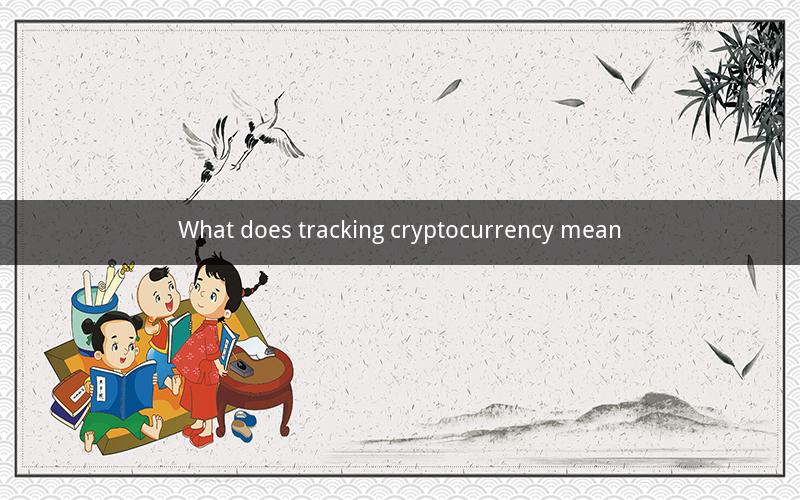
What does tracking cryptocurrency mean?
Table of Contents
1. Understanding Cryptocurrency
2. The Importance of Tracking Cryptocurrency
3. Tools and Methods for Tracking Cryptocurrency
4. Tracking Cryptocurrency for Security
5. Tracking Cryptocurrency for Investment
6. Challenges and Limitations in Tracking Cryptocurrency
1. Understanding Cryptocurrency
Cryptocurrency is a digital or virtual form of currency that uses cryptography for security. It operates independently of a central bank and is typically based on a decentralized system such as a blockchain. The most well-known cryptocurrency is Bitcoin, but there are thousands of others in existence.
2. The Importance of Tracking Cryptocurrency
Tracking cryptocurrency is essential for several reasons:
- Security: Ensuring the safety of your digital assets is crucial. By tracking your cryptocurrency, you can monitor for any suspicious activity and prevent theft or fraud.
- Investment: For those who invest in cryptocurrency, keeping track of their portfolio is vital. This helps them make informed decisions and adjust their investment strategies as needed.
- Regulatory Compliance: Governments and financial institutions are increasingly regulating cryptocurrency. Tracking your assets can help you stay compliant with these regulations.
3. Tools and Methods for Tracking Cryptocurrency
Several tools and methods can help you track cryptocurrency:
- Exchanges: Many cryptocurrency exchanges offer built-in tracking tools that allow you to monitor your portfolio's performance and value over time.
- Wallets: Digital wallets often have tracking capabilities, allowing you to keep an eye on your assets' location and balance.
- Blockchain explorers: These websites allow you to view and track transactions on a specific blockchain network.
- Third-party tracking services: Some companies offer comprehensive tracking services that integrate with various exchanges, wallets, and blockchains.
4. Tracking Cryptocurrency for Security
Tracking cryptocurrency for security involves:
- Monitoring transactions: Regularly reviewing your transactions helps you identify any unusual or fraudulent activities.
- Setting up alerts: Many wallets and tracking services allow you to set up alerts for specific events, such as large transactions or changes in your balance.
- Backing up your wallet: Regularly backing up your wallet ensures you can recover your assets in case of a security breach.
5. Tracking Cryptocurrency for Investment
Tracking cryptocurrency for investment purposes involves:
- Analyzing market trends: Monitoring the market trends and price movements of various cryptocurrencies can help you make informed decisions about buying, selling, or holding.
- Tracking performance: Keeping an eye on your portfolio's performance allows you to evaluate the effectiveness of your investment strategy.
- Adjusting your strategy: As the market evolves, tracking your cryptocurrency assets helps you adjust your investment strategy accordingly.
6. Challenges and Limitations in Tracking Cryptocurrency
Despite the advancements in tracking technology, there are still challenges and limitations:
- Privacy concerns: Cryptocurrency transactions are often pseudonymous, making it difficult to track the actual owner. This can lead to privacy concerns for some users.
- Volatility: Cryptocurrency prices are highly volatile, making it challenging to track their value over time.
- Complexity: The crypto market is vast and complex, making it difficult for new investors to navigate without proper guidance.
10 Questions and Answers
1. What is the difference between a blockchain and a cryptocurrency?
- A blockchain is a decentralized digital ledger that records transactions across multiple computers. Cryptocurrency is a digital or virtual form of currency that uses blockchain technology for security.
2. How can I keep my cryptocurrency safe from theft?
- You can keep your cryptocurrency safe by using secure wallets, enabling two-factor authentication, and regularly monitoring your transactions.
3. What are the benefits of tracking my cryptocurrency portfolio?
- Tracking your portfolio allows you to make informed decisions, adjust your strategy, and stay compliant with regulatory requirements.
4. Is it possible to track my cryptocurrency transactions across multiple exchanges?
- Yes, some third-party tracking services can integrate with various exchanges, wallets, and blockchains, allowing you to monitor your transactions in one place.
5. How do I choose the right cryptocurrency tracking tool for me?
- Consider factors such as ease of use, features, security, and compatibility with your preferred exchanges and wallets.
6. What should I do if I suspect my cryptocurrency has been stolen?
- Report the theft to your wallet provider and any relevant exchanges. Change your passwords and enable two-factor authentication to prevent further unauthorized access.
7. Can I track my cryptocurrency without using a third-party service?
- Yes, many exchanges and wallets offer built-in tracking tools that allow you to monitor your assets.
8. How can I stay up-to-date with cryptocurrency market trends?
- Follow reputable news sources, join cryptocurrency forums, and use tracking tools that provide real-time market data.
9. What is the best way to backup my cryptocurrency wallet?
- Use a secure backup method, such as a paper wallet or encrypted digital backup, and store it in a safe location.
10. How do I know if a cryptocurrency tracking service is reliable?
- Look for services with a good reputation, strong security measures, and transparent pricing. Read reviews and compare features to ensure the service meets your needs.